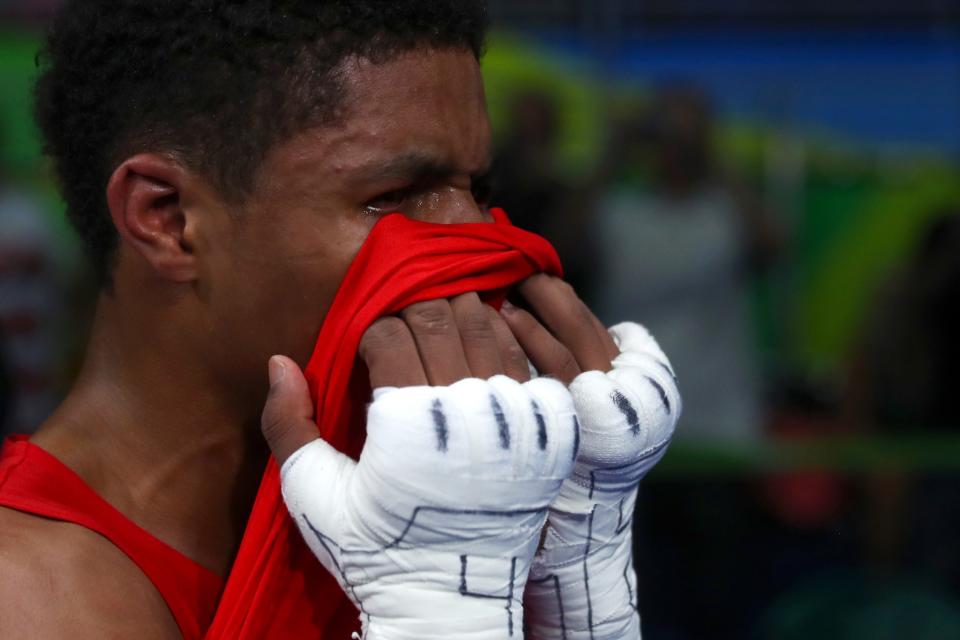Shakur Stevenson distraught after losing gold medal, but stardom still awaits
RIO DE JANEIRO – Shakur Stevenson took a seat on a small, folding plastic chair, a spot normally reserved for security guards to rest. This was behind the boxing venue, out in the open, out where his emotion was still raw.
The 19-year-old wore a towel draped over his head and doubled over as he sat, weeping heavily and screaming loudly into it. He was uncontrollable and inconsolable, a teenager incapable of processing a split-decision defeat at the hands of Cuban Robeisy Ramirez.
This was Olympic devastation, when a silver medal is considered a loss, when a kid can’t yet step back and see the big picture. From the past (the journey from the gyms of Newark, N.J., to an Olympic podium) to the present (his silver medal was the best U.S. men’s boxing result since 2004) to the future (an extremely promising professional career ahead). Yes, he wanted gold, but this was a long way to come with a long way to go.
None of it mattered in the moment. Not after a high-class fight at the bantamweight division. Ramirez of Cuba was the considerable favorite, looking to duplicate the gold he won in London. He was older, 22, more experienced and a big talent in his own right.

Ramirez clearly won the first round. Stevenson rallied to win the second. And in the finale, a late flurry by the Cuban may have been enough to tip the judges. Two of the three went for him. Just one gave it to Stevenson.
It was that close.
As the decision was announced Stevenson could only cover his face with his shirt. He was gracious enough to repeatedly congratulate Ramirez and he never cast doubt on the decision. “It was a close fight,” he said.
He couldn’t hide the pain, though. He didn’t want to try to hide the pain.
“I felt like I let a lot of people down,” Stevenson said later. “I’m disappointed in myself. I’m crushed.”
He let no one down. He shouldn’t be disappointed in himself. He was wailing in pain anyway.
“He’s been uncontrollable here, crying,” Team USA coach Billy Walsh said. “In some respects he has to get ready for the medal ceremony.”
Stevenson would gather himself for that, fight out a few smiles and find a silver medal draped around his neck.
That was part of Stevenson’s disappointment, he wanted to begin the restoration of USA Boxing. For decades it was the most feared team in the world, producing a parade of greats from Muhammad Ali to Sugar Ray Leonard to Oscar De La Hoya and so on. It’s been mostly disappointment after disappointment the past decade and a half.
“Of course it hurts,” said Kay Koroma, Stevenson’s personal coach. “You go through something like that, [it’s like] they pulled everything out of you. … Once he realizes the best of the best had to pull out everything in the bag, [he’ll say], ‘That was my gold medal.’
“Shakur Stevenson woke America up,” Koroma continued. “Shakur Stevenson made America smile. It wasn’t just Newark, it was all of America. I told him, ‘Your smile is golden.’ ”
Stevenson’s future is beyond bright. He has tremendous reach and defensive skills. His coaches rave about his work ethic and dedication. There is a charisma to him, a likable, sellable personality in a sport desperate for one. There’s an inspiring backstory of growing up the oldest of nine children in Newark’s Central Ward neighborhood. There are quirky marketing bits like how he was named after Tupac Shakur and for a stretch lived on Muhammad Ali Boulevard.

Floyd Mayweather has declared Stevenson the next Floyd Mayweather, which is the highest compliment Floyd Mayweather can give. Perhaps it’s not just because Mayweather wants to sign him to his promotion, The Money Team. Mayweather flew down to Rio to watch his fights and recruit him. Everyone is recruiting the kid, though.
“I haven’t signed with anybody,” Stevenson said, promising to go home and weigh the options.
Professional boxing is a tough game, a brutal game where nothing is certain. He at least has all the markings of the next big star.
Fans “should expect one of the best boxers coming up,” Stevenson said. “I want to be a great pro. I want to break records. I want to win titles. I am not going to the pros with the gold medal that I wanted, but … hey.”
Over and over, the loss kept dragging him back. That will fade eventually, but not now. Maybe that’s a good thing.
“It’s the worst feeling in the world,” Walsh said. “I’ve been there many times. Too many times. To be sitting in a dressing room after losing. To be sitting in a dressing room losing when maybe you had the opportunity to win, when you’ve been good enough to win. He had a massive opportunity to do that.
“We often learn more from a loss than a victory. When you’re winning it masks over the cracks. Today we saw the cracks what they were. He has the idea and the tools to mend that. What he needs is a bit higher work rate and he’ll be here for a time to come.”
Stevenson probably understands that, but the tears said he could’ve lived without the lesson for the day. He said he hopes he meets Ramirez one day as a pro, promising a different result.
On a day he dreamed for forever, after a fight he’d trained relentlessly toward, the future felt a long way off. This was the brutality of defeat, a teenager ripped apart, Olympic style.
“I’m going to come back stronger,” Stevenson said.
It was part statement of confidence to the media. It was part promise to himself.

